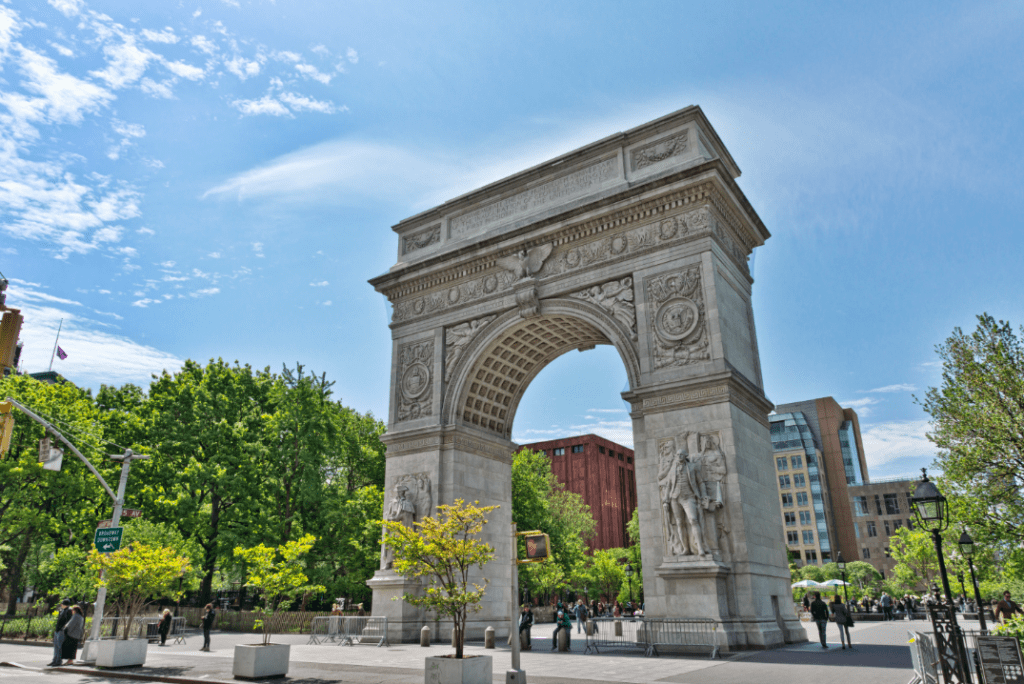
“I walked for hours from park to park. In Washington Square, one could still feel the characters of Henry James and the presence of the author himself. Entering the perimeters of the white arch, one was greeted by the sound of bongos and acoustic guitars, protest singers, political arguments, activists leafleting, older chess players challenged by young. This open atmosphere was something I had not experienced, simple freedom that did not seem to be oppressive to anyone.” (Smith, 27)
Smith describes how Washington Square Park has been, in decades past, a place of freedom for all who enter, to express themselves however they may wish, whether it be through music, protest, or academic work. There were even those who chose to express themselves through the use of drugs, although they were largely driven out by the 80’s. In the modern era, much of this is similar; one can find protests of all kinds taking place near the Arch. Music from speakers, phones, or bands sweeps through the green constantly, although there are far fewer bongos and far more saxophone. There are still activists handing out leaflets, although now these are about the crimes of Amazon or Trump or Apple, and there are still those who ignore those activists completely and just keep walking. There was even a major drug bust in the park just last year, so that is also still the same. Students lay on the grass and study, or take naps, or hang out with their friends. And old men still challenge each other to chess matches and offer to teach those new to the game.
The freedom of expression still exists in Washington Square Park, but some of it has, perhaps, been lost to time. For example, no graffiti will stand in the park for very long, as now the city has a vested interest in keeping it clean and consumable for families. One could no longer find the atmosphere so open, as the park is consumed by college students and parents trying to find a way to siphon off their children’s energy. Any time the temperature goes above sixty, it becomes full to bursting, to the point where a person would be lucky to find an empty spot of grass.
And while there may be activists and protesters, but there are also corporate entities trying to gain a foothold in a youthful space; Hello Fresh offers discounts on a new member’s first meal, or Lyft gives out a coupon for thirty percent off on the first ride, or Netflix offers a thirty day free trial. And these corporations know what they’re doing; a college student who can’t afford the meal plan is easily drawn in by the promise of cheap food, paying for Netflix sounds better than paying for the movies, and Lyft seems, at first, more convenient than the subway. These entities gain a space, and for every inch they take up, there’s less space for those trying to do genuine good.
The crackdown on drugs, vagrancy, and other nonviolent crimes means that the park is no longer a place where a person can simply be. You can’t pitch a tent and sleep there, despite the fact that it is a public space. You also technically require a permit for busking in a park, so long as that busking can be constituted as solicitation. These things only limit the freedom of those in the park. The solicitation rule is cleverly designed to prevent begging without preventing corporate entities from getting members, as one can get a permit for their actions. The law against camping is clearly meant to be enforced on the homeless, as is the law against obstructing seating space. They are meant to make the park safer and more palatable to the upper and middle classes.
This is not to say that Washington Square Park is no longer a place where people can express themselves. People still wear new fashions and experiment with their hair. We still take photos, play instruments, and drink coffee with our friends. There are many forms of expression now that may have been illegal in the seventies. For example, same-sex weddings can be held in Washington Square Park, whereas in the seventies same-sex marriage was illegal. And there are forms of expression that are easier to participate in; news of protests can be spread across social media, allowing more people to join in. Anyone who has a phone can learn photography, and learning a language is easier than ever with a multitude of apps so that a person can express themselves in several languages.
Indeed, the space is not necessarily oppressive to anyone except possibly republicans, but there doesn’t seem to be enough room for everyone, and so the freedom is no longer simple. One cannot play above a certain volume at a certain time, or expect to be left alone by the various persons with an agenda, a pamphlet, and a request for donations. Patti Smith, an artist trying to find herself and her form self-expression, would likely find herself drowned out in the Washington Square Park that exists today.